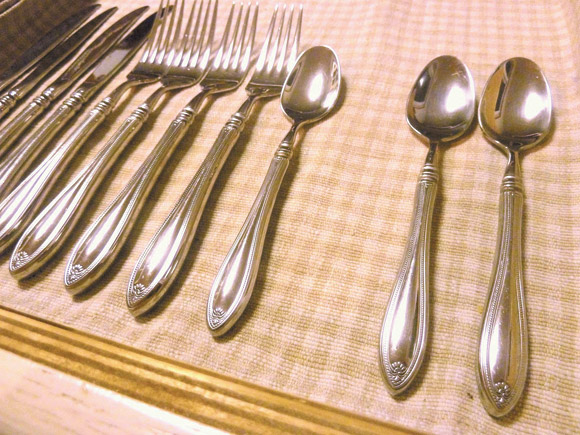Spoon-fed Thinking Out Of The Box
Maybe it’s a female predilection. The guys I know don’t care if they are eating off of a warped plastic lid with a disposable fork and having a drink out of a cardboard concentrated orange juice can — as long as there’s food on or in it.
I wouldn’t care what the table setting is either if I were camping in Kalalau Valley on the fifth night after having packed only four days of food.
But left to be in a comfortable cocoon, I prefer hefty yet finely crafted utensils: a charming porcelain plate with scalloped details and a delicate Victorian teacup. And if there happens to be something edible to go with them, then that’s gravy.
One day I decided it was my birthday, even if it wasn’t, and thought I’d buy myself some flatware. I searched thoroughly and extensively online and found the most beautiful yet timeless set of quality 18/10 stainless-steel utensils that I could afford.
I sensibly ordered only four sets, each five-piece place setting arriving impeccably packed in its own box. I meticulously placed each piece in a special drawer, and for the next couple of months made sure each was accounted for, especially teaspoons, which are the first to go out the door with a bowl of cereal.
So you can imagine my dismay when one of those cherished teaspoons went AWOL.
I looked everywhere. I interrogated everyone who used it. My heart sank when I imagined that it was thrown out with the carrot peelings in the sink. I tossed and turned in my sleep, wondering where it could be, as anxious as if I were still seven months pregnant and the winds of Hurricane Iniki were howling outside, ready to burst through the jalousies. Oh, wait, that’s a story for another day.
Anyway, four months went by and I finally forgot about the missing spoon — until one recent morning when I happened to pull open the utensils drawer and there lay a space for it, like the obviously missing jet in the military’s missing-man formation. Of course, the metaphor is not meant to make light of the veteran we lost forever, but to emphasize the ridiculous impact that the loss of one inanimate spoon had on me.
That morning, I vowed that the empty space would stare at me for the last time. I was determined to cure this silly malady. I finally would order another five-piece place setting online. But the dilemma always was — other than the fact that my credit card balance is dangerously similar to my checking account balance — that no matter how many sets I get, I always will be missing one spoon.
Then came an “out-ofthe-box” revelation: Google Amazon.com and see if it is selling those spoons by the piece instead of by the set.
Sure enough, in just 10 minutes, I was able to order another teaspoon — and an extra one — at half off with free shipping!
I totally am aware that looking for replacement pieces is not a new concept,
In fact, it is older than any Victorian teacup I might possess. But I had let despair, apathy and rigidity rule and was blinded to the fact that just because I did something one way the first time — like buying a whole place setting — doesn’t mean that I have to keep doing it the same way again.
Mundane as the case of a missing spoon was, I saw how changing my conventional thinking saved me from further grief. I also acquired a bonus, a spare for the next time someone mistakenly walks out my door with a spoon in their cereal.
janeesaki@gmail.com




